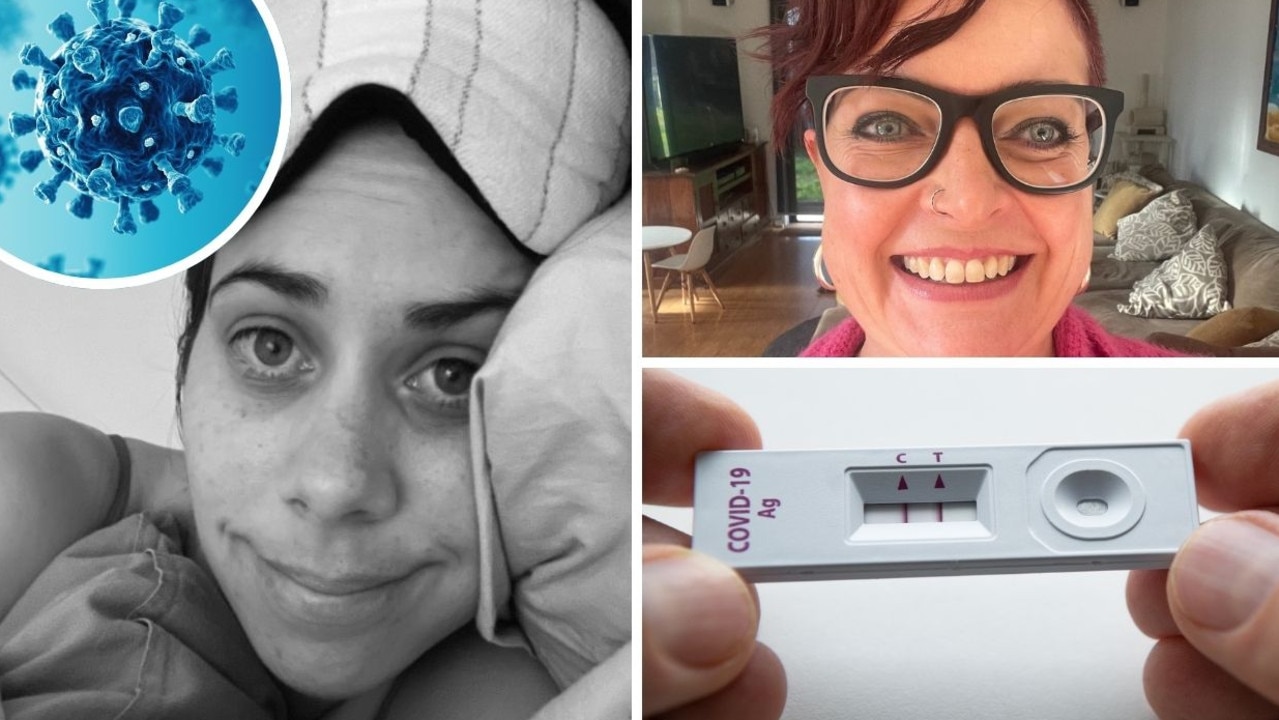Drastic shortfall in EU AstraZeneca vaccines
The European Union is facing a vaccine crunch with AstraZeneca rolling out 10 million doses less than expected as scientists warn about a new COVID variant.
Coronavirus
Don't miss out on the headlines from Coronavirus. Followed categories will be added to My News.
Countries in the European Union face a vaccine supply crunch in the near term because of a drastic shortfall in doses from AstraZeneca.
The Anglo-Swedish company is providing only 25 to 40 per cent of the more than 100 million doses it had originally promised for the first quarter of this year, which were meant to jumpstart the EU’s vaccination programmes.
EU industry commissioner Thierry Breton, who is heading a commission task force to overcome supply bottlenecks, said of AstraZeneca: “I am confident they will be able to catch up.”
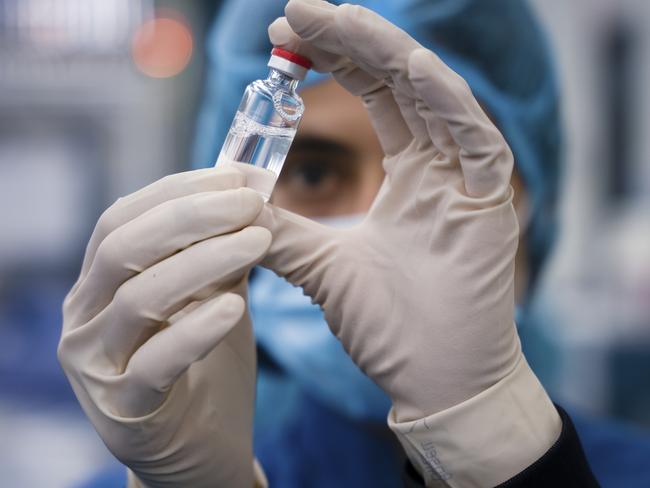
He said the production yield in a Belgian factory used by AstraZeneca was “drastically increasing” with a 50 per cent rise, and output in an Italian factory was also improving.
European Commission chief Ursula von der Leyen has staked her reputation on the vaccine rollout across the European Union, after having her commission take over advance purchase agreements on behalf of the member states.
She has run into fierce criticism from some capitals over the stuttering start, largely due to the AstraZeneca supply problem, and has turned her attention to ensuring a stronger follow-up.
“We’re still struggling to get started,” she admitted, adding that a mechanism had been launched to allow member states to share doses between them once supplies permitted.
She also said a new commission project, called the HERA Incubator, has been created to boost research and detect virus variants.
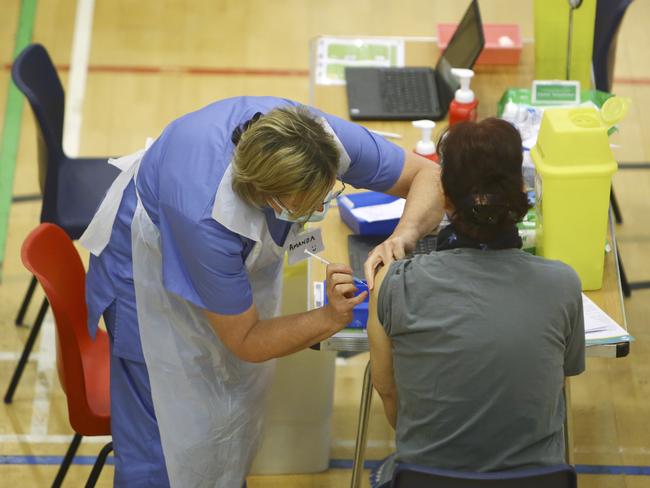
So far, the European Union has authorised the AstraZeneca, BioNTech/Pfizer and Moderna vaccines for use, and is considering ones from Johnson & Johnson, CureVac and Novavax.
Its vaccination programme has lagged behind those of the US, Israel and Britain, but the bloc is looking to quickly scale up.
Ms Von der Leyen said 33 million doses of the three authorised vaccines have so far been delivered to EU countries and 22 million people have received at least one dose, with seven million having received the two doses for full vaccination.
EU BUYS UP MODERNA VACCINE
The European Union has bought up to 300 million extra COVID-19 vaccine doses from US firm Moderna, Ms von der Leyen said on Wednesday.
The new deal, which she hailed as “good news”, adds to the EU’s vaccine stock as it strives to meet a target of fully vaccinating 70 per cent of adults by mid-September.
The commission now has access to a “portfolio” of 2.6 billion doses of three EU-authorised vaccines and three more prospective ones, to be provided this year and next, von der Leyen told a media conference.
Numerically, that is more than enough for the EU’s 450 million inhabitants, with the excess going to neighbouring countries, she said.
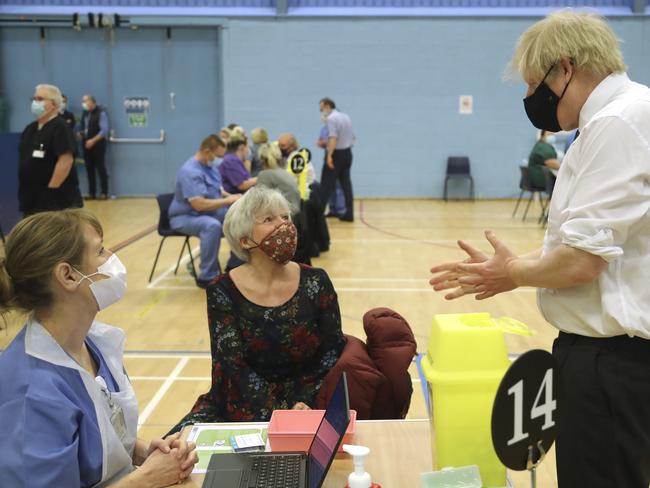
But another reason for such a big stock was to hedge against “the possibility for the virus to mutate”, as is already being seen with variants, some of which appear to be at least partially resistant to some of the current vaccines.
“We will always have to be vigilant to be able, if there are escaped mutations, to fight them with improved vaccines,” she said.
The terms of the new deal with Moderna, covering a firm order for 150 million doses late this year and an option for 150 million more next year, were kept secret under confidentiality clauses the commission has agreed with vaccine makers.
SCIENTISTS FEAR UK, CALIFORNIA VARIANTS HAVE MERGED
Scientists fear the UK and California COVID variants have merged into a new mutated virus that has sparked concerns the pandemic could enter a new phase.
Discovered in a Californian laboratory, it is not yet clear how much of a threat the recombination could pose.
But if confirmed the recombinant would be the first detected in the pandemic, New Scientist reports.
Bette Korber, a computational biologist at the laboratory who made the discovery, said she had seen “pretty clear” evidence.
The recombinant carries a mutation from the Kent variant – known as B.1.1.7 – which makes the UK virus more transmissible.
It also carries another mutation from the California variant – known as B.1.429 – that can produce resistance to antibodies.
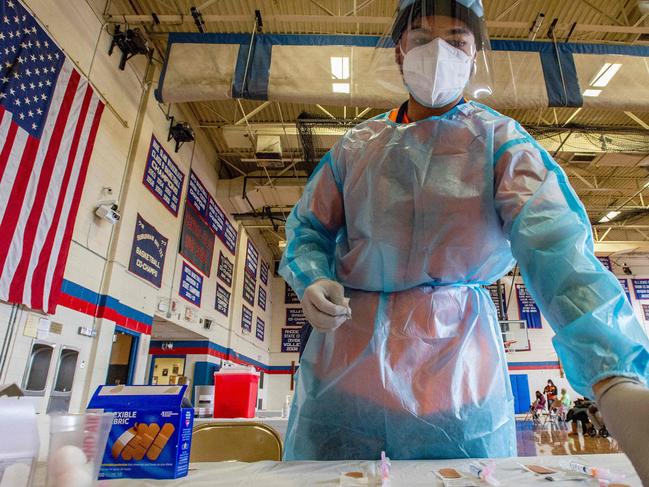
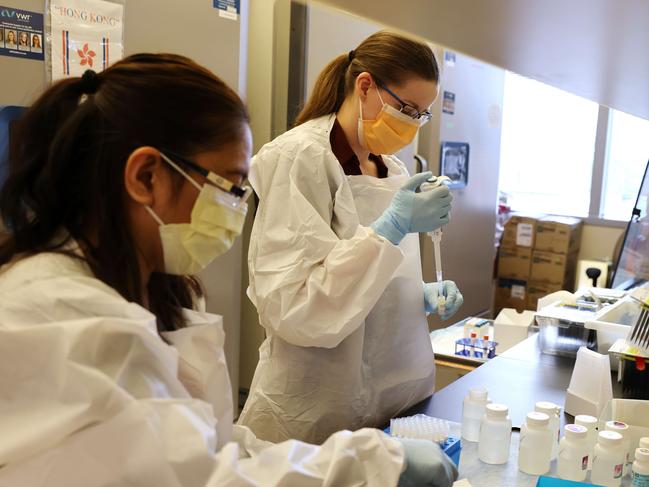
“This kind of event could allow the virus to have coupled a more infectious virus with a more resistant virus,” Ms Korber said.
Recombination can bring together different mutations, according to The Sun.
It can lead to new, more dangerous variants, but it’s not clear how much of a threat this first recombination may be.
The emergence of new COVID variants recently has meant some people could be infected with two different strains, research has found.
“We may be getting to the point when this is happening at appreciable rates,” said Temple University biology professor Sergei Pond, in Pennsylvania.
He added there is no evidence yet of widespread recombination, but “coronaviruses all recombine, so it’s a question of when, not if”.
Dr Lucy van Dorp, from the Genetics Instiute at University College London, said she hadn’t heard about the recombinant yet, but “would not be overly surprised if some cases start to be detected”.
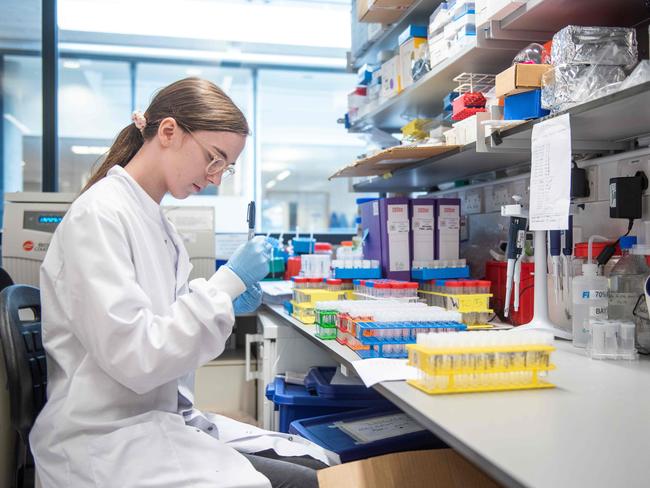
“We want to know where the next coronavirus might come from,” said Dr Marcus Blagrove, a virologist from the University of Liverpool, UK, who was involved in a study into using Artificial Intelligence (AI) to predict where the next coronavirus may emerge.
“One way they’re generated is through recombination between two existing coronaviruses.
“So two viruses infect the same cell and they recombine into a ‘daughter’ virus that would be an entirely new strain.”
The Kent Covid variant has swiftly become the most dominant in parts of the UK, having emerged only a few months ago.
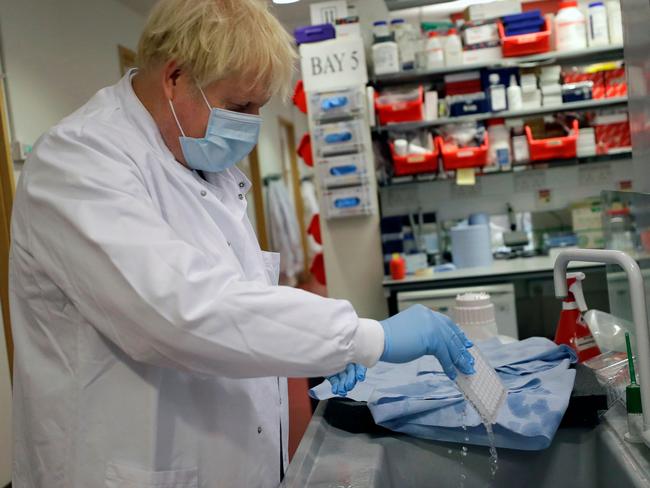
It’s up to 70 per cent more infectious than the original strain, scientists fear.
Scientists in California believed a homegrown coronavirus strain in the state could be responsible for a dramatic rise in cases.
Two separate research groups discovered the apparent California strain while hunting for the new variant that is believed to have come from the UK, according to the Los Angeles Times.
The supposed California strain is in the same “family tree” as the British strain and could be behind the state’s spread over the past few months.
NZ LIFTS COVID LOCKDOWN
New Zealand lifted a snap COVID-19 lockdown in its largest city Auckland on Wednesday, with Prime Minister Jacinda Ardern expressing confidence the outbreak was contained.
The stay-at-home order for the city of almost two million was issued on Sunday after three community cases emerged, the first lockdown in Auckland for almost six months.
Ms Ardern said close contacts of the three cases, all members of the same family, had all since tested negative, with the exception of three people now isolation.
“(It appears) that we don’t have a widespread outbreak, but rather a small chain of transmission which is manageable via our normal contact tracing and testing procedures,” she said.
Ms Ardern said the Auckland lockdown would end late Wednesday, although the city would remain at virus alert level two, which restricts numbers at public gatherings to 100 and requires face masks on public transport.
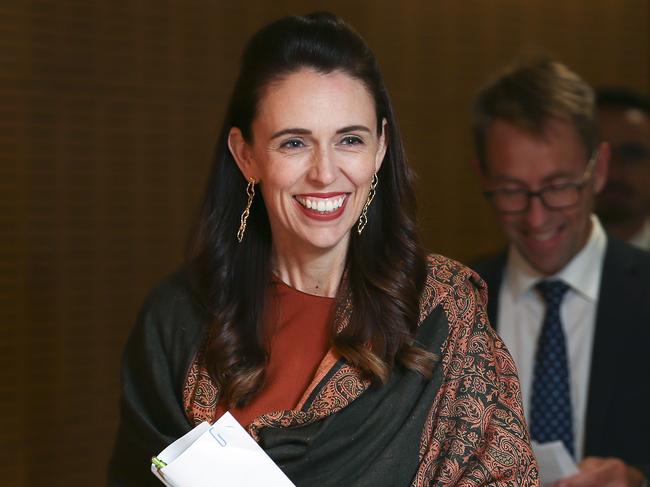
An exception was people linked to a suburban school attended by three of the positive cases, with students, parents and teachers all required to remain at home.
New Zealand has been widely praised for its handling of the pandemic, with just 26 deaths in a population of five million.
Ms Ardern said the country’s COVID-19 response -- which involves rigorous contact tracing and widespread testing when there is a community case -- had again proved effective.
“We wanted to make sure we took a cautious approach because that’s much, much better than getting it wrong and having a large scale outbreak and a long lockdown,” she said.
The source of the original infection — which proved to be from the more transmissible strain first detected in Britain — remains uncertain and Ms Ardern said there was no room for complacency.
“There is an indescribable anxiety that comes with the daily grind of managing a pandemic and I think we all feel it,” she said.
BRAZIL BATTLES ‘FAST-SPREADING’ COVID-19 VARIANT
Brazil, which has been hard-hit by the coronavirus, is racing against time to curb a new variant, which is spreading fast.
The country, whose COVID-19 death toll is nearing 240,000, is the birthplace of a new, more contagious variant of the virus that emerged in the Amazon and is moving rapidly.
It comes as the hope unleashed by the first COVID-19 shots is giving way to frustration that the government’s vaccination campaign is beset by the same chaos that has marked its pandemic response.
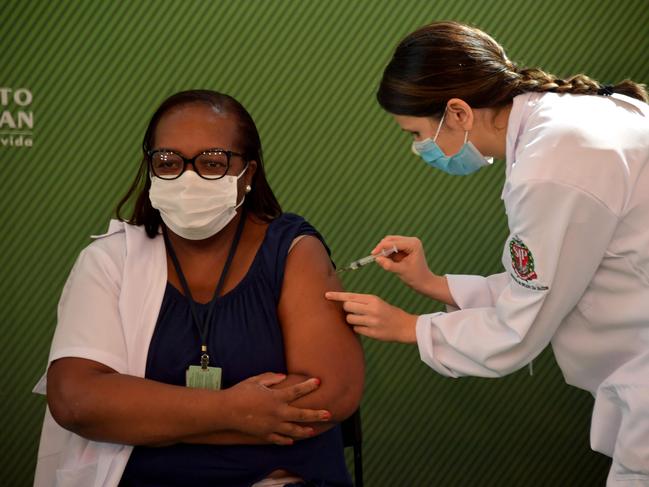
One month after the first dose was administered to a Sao Paulo nurse on January 17 — setting off a flurry of optimism in the country with the world’s second-highest death toll — Brazil has managed to give shots to about 5.3 million people.
That number accounts for 2.5 per cent of the nation’s population of 212 million.
“The lack of doses has made it impossible for us to do a mass vaccination drive, something we know how to do,” said Natalia Pasternak, a microbiologist at the University of Sao Paulo.
But time is of the essence.
“That’s why the slow pace of vaccination is so worrying, because the longer we let the virus circulate unhindered, the more mutations may appear”.
Ironically, the sprawling South American country is known for its turbocharged vaccination campaigns.
Health workers regularly defy the logistical challenges of reaching the remotest corners of the Amazon rainforest and arid “Sertao,” or hinterland, to administer shots.
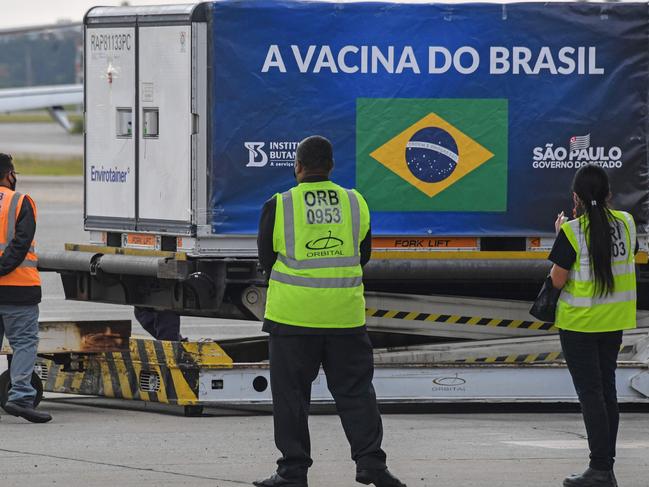
In 2010, Brazil vaccinated more than 80 million people against H1N1 — the swine flu virus — in less than three months.
Meanwhile, reports have emerged of people with connections cutting in line for vaccination, and of nurses giving fake doses to elderly Brazilians.
The campaign has been marred by a lack of co-ordination between state, local and federal authorities, exacerbating the chaos.
“The government made the mistake of putting all its eggs in one basket,” said Ethel Maciel, an epidemiologist at the Federal University of Espirito Santo.
Under President Jair Bolsonaro, a far-right social-distancing sceptic who routinely flouts expert advice on containing the new coronavirus, Brazil managed to secure just six million doses for the start of its vaccination campaign.
Despite the difficulties, Health Minister Eduardo Pazuello vowed last week Brazil would vaccinate its entire population by the end of the year. Experts are sceptical.
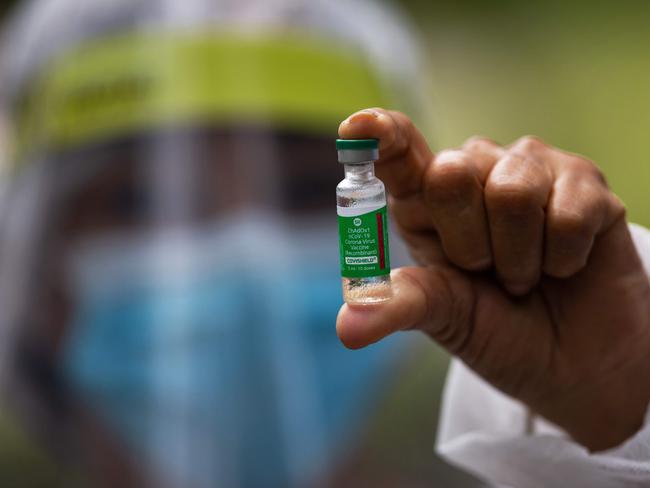
“It’s possible we’ll secure enough doses, but it will be difficult to get them administered by the end of the year,” said Guilherme Werneck, an epidemiologist at Rio de Janeiro State University.
“There would have to be a very radical change.”
Shortages have forced several key areas to halt immunisation, including Rio de Janeiro which announced Monday it had to suspend the campaign in the city of 6.7 million until more doses arrived.
During the worldwide race last year to gain access to the most promising test vaccines, Bolsonaro bet big on the one developed by British-Swedish pharmaceutical firm AstraZeneca in partnership with Oxford University.
One of the president’s top opponents, Sao Paulo Governor Joao Doria, meanwhile struck a deal for his state to purchase and help produce another vaccine, CoronaVac, developed by Chinese firm Sinovac.
That was the vaccine that ultimately got injected into the first Brazilian arm, and it has saved Brazil from having even fewer doses on hand.
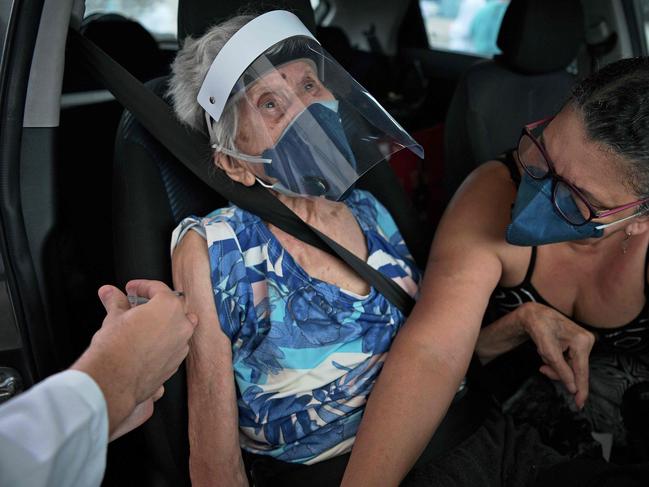
“It’s a good thing (Sao Paulo) made that deal, because otherwise all we’d have today would be two million doses of the AstraZeneca vaccine, for a population of more than 200 million,” Mr Maciel told reporters.
Meanwhile, Mr Bolsonaro “spearheaded an anti-vaccination campaign, saying he wouldn’t get vaccinated and warning people it could turn them into alligators,” added Maciel, who has submitted a petition for Congress to impeach the president over what she calls his “criminal” handling of COVID-19.
The Sinovac and AstraZeneca vaccines are the only two that Brazilian regulators have approved so far.
The government is counting on delivery of another 100 million doses of the former by the end of August, and 210.4 million doses of the latter by the end of the year.
Both require two doses.
JOHNSON & JOHNSON FILES FOR EU VACCINE APPROVAL
Pharmaceutical giant Johnson & Johnson has applied for authorisation for their coronavirus vaccine in the EU with a decision possible by the middle of March, Europe’s drugs regulator said on Tuesday (local time).
The single-shot vaccine would be the fourth jab to be approved for use across the 27-nation European Union if it gets the green light from the Amsterdam-based European Medicines Agency.
“EMA has received an application for conditional marketing authorisation for a COVID-19 vaccine developed by Janssen-Cilag International N.V.,” the watchdog said, referring to J & J’s European subsidiary.
Experts at the regulator “could issue an opinion by the middle of March 2021, provided the company’s data on the vaccine’s efficacy, safety and quality are sufficiently comprehensive and robust.” J & J’s vaccine has been under a “rolling review” by the EMA since December 1. The other three vaccines currently authorised for use across the EU’s member states are those developed by AstraZeneca, Pfizer/BioNTech and Moderna.
The European Commission has ordered 200 million doses of the Johnson & Johnson vaccine with an option for 200 more. It says 100 million doses should be delivered by June if it is approved.
Johnson & Johnson has asked US regulators for emergency authorisation for the United States.
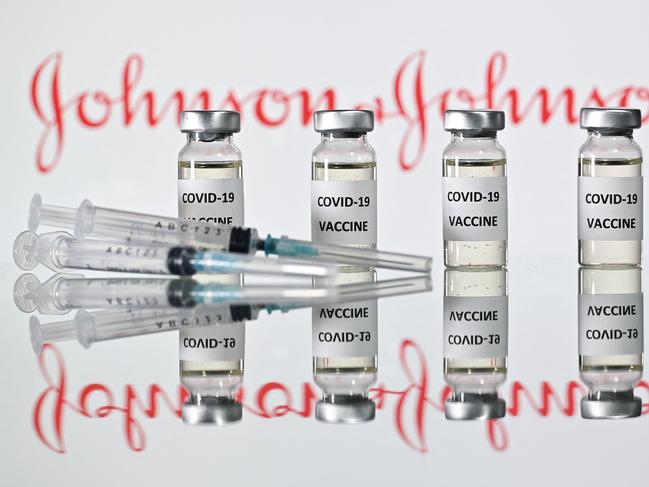
DUTCH ORDERED TO END VIRUS CURFEW
A Dutch court ordered the government on Tuesday (local time) to lift a nationwide coronavirus curfew that sparked riots in the Netherlands, as frustration mounts throughout the world against virus measures almost a year into the deadly pandemic.
Governments face pushback from populations tired of measures aimed at slowing the virus’s relentless spread, and countries were scrambling to secure sought-after vaccines in a bid to return to a pre-pandemic normal.
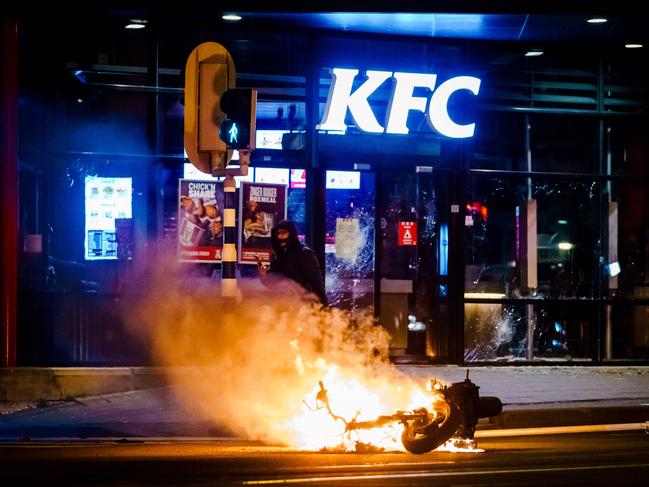
A deadly second wave prompted a further tightening of restrictions across Europe throughout the northern hemisphere winter, including in the Netherlands which imposed a 9pm to 4:30am curfew in January.
Violent protests engulfed several Dutch cities in defiance of the curfew — the country’s worst riots in decades — and last week the government extended the overnight stay-at-home order until March 2.
On Tuesday (local time) a judge said the government wrongly used emergency powers to bring in the curfew after a case launched by the Viruswaarheid (Virus Truth) group, which has led a series of protests against coronavirus measures in the Netherlands.
“The curfew must be lifted immediately,” the court said in a statement. “The curfew is a far-reaching violation of the right to freedom of movement and privacy … This requires a very careful decision-making process.”
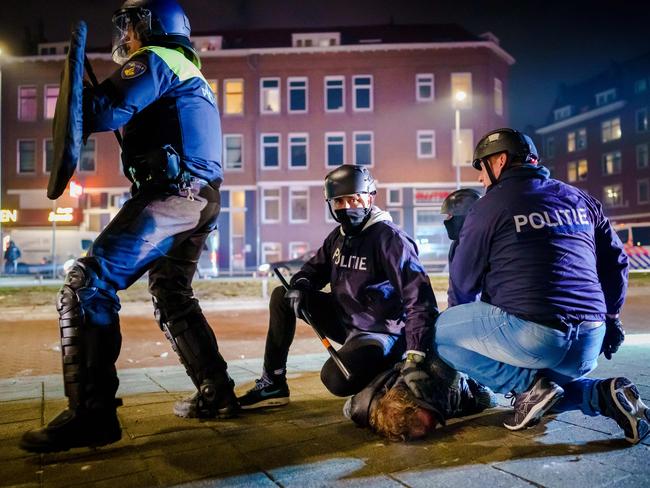
HUNGARY RECEIVES CHINA VACCINE
In a boost for poorer countries, the World Health Organisation approved the AstraZeneca vaccine paving the way for millions of doses to be distributed.
The AstraZeneca shot, which is easier to store and transport than some of its rivals, will account for almost all the doses set to be shipped under Covax, an international program designed to ensure that poor countries are not overlooked.
Hungary on Tuesday became the first EU country to receive China’s Sinopharm coronavirus vaccine, with 550,000 doses arriving in Budapest.
The European Medicines Agency has so far approved vaccines for the bloc developed by US-German firm Pfizer-BioNTech, US firm Moderna and British-Swedish firm AstraZeneca with Oxford University.
Also on Tuesday, Japan outlined a cautious coronavirus vaccine rollout — but the minister overseeing the process admitting he had “no idea” how much of the population will be vaccinated by this summer’s Olympics.
Japan has lagged behind other major economies as it is running domestic trials before approving vaccines.
Meanwhile, the economic devastation from the virus was again laid bare. The Netherlands economy shrunk 3.8 per cent in 2020, the sharpest contraction ever measured, the country’s statistics office said on Tuesday.
And in Singapore, which is suffering its worst-ever recession, the government unveiled a fresh multibillion-dollar package to help pandemic-battered businesses.
More Coverage
Originally published as Drastic shortfall in EU AstraZeneca vaccines




